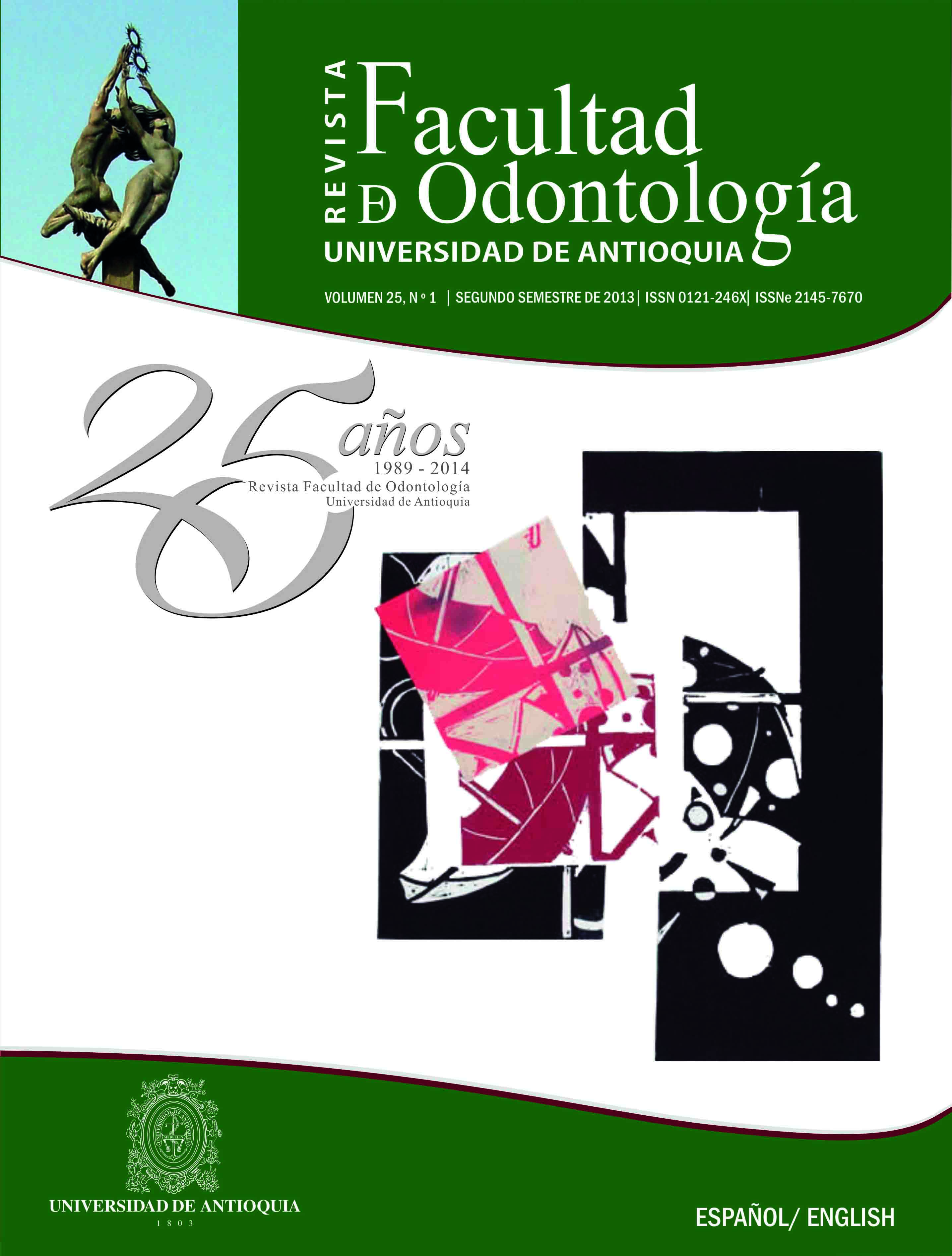La odontología: profesión liberal que se debate entre la distinción y la extinción
Abstract
Introducción: este estudio abordó la profesión odontológica y su práctica, en una época caracterizada por la mercantilización de los servicios de salud, en el ámbito geográfico del área metropolitana del Valle de Aburrá. Métodos: estudio descriptivo valorado desde la categoría: condiciones de vida de los odontólogos desde la teoría sociológica de Bourdieu. Muestra representativa de 461 odontólogos obtenida de las bases de datos de los Generadores de Residuos Hospitalarios y Similares —RH1— a quienes se aplicó una encuesta. Resultados: caracterización de la profesión odontológica como producto de una práctica profesional, que presenta una presunta disposición social hacia la distinción a través de ‘habitus’, procesos de acumulación de capitales social, económico y cultural, clases y disputas sociales. Los resultados se analizaron bajo el supuesto: “la odontología es hoy una profesión liberal que se debate entre la distinción y la extinción”, fenómeno propiciado por las tensiones, disputas y conflictos de un mercado que dispone a los profesionales en una lucha por alcanzar nuevos y mejores espacios sociales, con ciertos estilos de vida y modos de vivir, mediados por la injerencia de políticas neoliberales en Colombia. Conclusiones: la situación de la profesión odontológica en el área metropolitana del Vallé de Aburrá, recreada a partir de las condiciones de vida de los encuestados en el marco de la investigación, permite hacer un llamado sobre la necesidad de repensar los procesos de formación del talento humano en salud, la producción de conocimientos y la dimensión de la prestación de servicios de salud.
ABSTRACT. Introduction: this investigation covered the dental profession and its practice, in a time characterized by the merchandizing? of health services within the geographical scope of the Área Metropolitana del Valle de Aburrá. Methods: this is a descriptive study validated as the category: living conditions of dentists from Bourdieu’s sociological theory. The sample consisted of 461 dentists, obtained from the databases of Hospital Waste Generators and Similar -RH1- (in Spanish: Generadores de Residuos Hospitalarios y Similares); who were surveyed. Results: characterization of the dental profession as a product of a professional practice with an apparent disposition towards social distinction through ‘habitus’, capital processes of social accumulation, economic and cultural insertion in social class and social disputes. The results are analyzed under the assumption: “Today´s dentistry is a profession that is torn between distinction and extinction”, phenomenon fueled by tensions, disputes and conflicts of a market that places the professionals in a struggle to achieve new and better social spaces, with select lifestyles and living conditions mediated by the influence of neoliberal policies in Colombia. Conclusions: the situation of the dental profession in the Metropolitan Area of Valle de Aburra, parting from the living conditions of those dentists surveyed in this study, makes us consider the need for rethinking the educational processes of the human talent in the health areas, the production of knowledge and the dimension of the dental care rendered.
Downloads
Downloads
Published
How to Cite
Issue
Section
License
Copyright (c) 2014 Revista Facultad de Odontología Universidad de Antioquia

This work is licensed under a Creative Commons Attribution-NonCommercial-ShareAlike 4.0 International License.
Copyright Notice
Copyright comprises moral and patrimonial rights.
1. Moral rights: are born at the moment of the creation of the work, without the need to register it. They belong to the author in a personal and unrelinquishable manner; also, they are imprescriptible, unalienable and non negotiable. Moral rights are the right to paternity of the work, the right to integrity of the work, the right to maintain the work unedited or to publish it under a pseudonym or anonymously, the right to modify the work, the right to repent and, the right to be mentioned, in accordance with the definitions established in article 40 of Intellectual property bylaws of the Universidad (RECTORAL RESOLUTION 21231 of 2005).
2. Patrimonial rights: they consist of the capacity of financially dispose and benefit from the work trough any mean. Also, the patrimonial rights are relinquishable, attachable, prescriptive, temporary and transmissible, and they are caused with the publication or divulgation of the work. To the effect of publication of articles in the journal Revista de la Facultad de Odontología, it is understood that Universidad de Antioquia is the owner of the patrimonial rights of the contents of the publication.
The content of the publications is the exclusive responsibility of the authors. Neither the printing press, nor the editors, nor the Editorial Board will be responsible for the use of the information contained in the articles.
I, we, the author(s), and through me (us), the Entity for which I, am (are) working, hereby transfer in a total and definitive manner and without any limitation, to the Revista Facultad de Odontología Universidad de Antioquia, the patrimonial rights corresponding to the article presented for physical and digital publication. I also declare that neither this article, nor part of it has been published in another journal.
Open Access Policy
The articles published in our Journal are fully open access, as we consider that providing the public with free access to research contributes to a greater global exchange of knowledge.
Creative Commons License
The Journal offers its content to third parties without any kind of economic compensation or embargo on the articles. Articles are published under the terms of a Creative Commons license, known as Attribution – NonCommercial – Share Alike (BY-NC-SA), which permits use, distribution and reproduction in any medium, provided that the original work is properly cited and that the new productions are licensed under the same conditions.
![]()
This work is licensed under a Creative Commons Attribution-NonCommercial-ShareAlike 4.0 International License.









